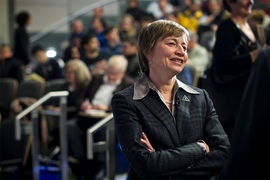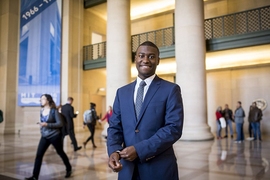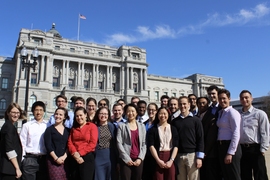On April 24-26, 24 MIT graduate students, undergraduates, and postdocs traveled to Washington to participate in the annual Science-Engineering-Technology Congressional Visits Day (CVD). The delegation met with 80 offices of the U.S. Senate and House of Representatives from 22 states, including staff from three House and Senate committees, to advocate for continued federal investment in basic science and engineering research. The Science Policy Initiative (SPI), a student group that facilitates student involvement in public policy, organized the visit, marking the 11th consecutive year MIT students have participated in the event.
“We hope teaching students about political advocacy and training them to interact with policymakers, and non-scientists in general, will amplify the impact our graduates and trainees can have in their respective communities,” said Shelby Doyle, a graduate student in the MIT Department of Biological Engineering, who organized the trip. “It also ignites a further sense of civic duty, getting MIT students engaged in the policy-making process,” added Peter Su, another trip organizer and a graduate student in the Department of Materials Science and Engineering.
In meetings with both Republican and Democratic offices, students presented a unified message, aiming to garner bipartisan support for science funding. They shared experiences illustrating the impact of science funding on their lives, their home districts and states, and the American economy as a whole. “It is critical that scientists and engineers engage with policy-makers to tell their stories about the importance of federal funding for research. Graduate students and postdocs are among the best messengers, because they are the future of research,” said Kate Stoll, senior policy advisor at the MIT Washington Office, who provided additional guidance for students before their meetings.
The focus of CVD on science and the federal budget was particularly timely this year. The trip came on the heels of President Trump’s March budget proposal, which included cuts to several U.S. science agencies, including the National Institutes of Health and Department of Energy. “The Trump Administration is proposing a dramatic rollback of investments in most areas of science and technology, at a scale larger than we’ve seen since the end of the Apollo program,” said Matthew Hourihan, director of the R&D Budget and Policy Program at the American Association for the Advancement of Science, who briefed the students on the budget process. “This would undoubtedly have very serious consequences for the American science and engineering communities.”
In addition, the March for Science had taken place the previous Saturday in Washington and across the nation. Congressional negotiations over appropriations bills for the 2017 budget were ongoing, inspiring an additional sense of urgency for many students to get their messages across. “With the budget vote set for [the following] Friday, there was an incredible energy on the hill,” said Erin Rousseau, a graduate student in the Harvard-MIT Health Sciences and Technology Program and a first-time CVD participant. “Many of the offices were looking for personal stories they could share, which made CVD feel vital to the defense of science funding.”
The student delegation requested a combined $54 billion for the fiscal year 2018 budgets of the National Institutes for Health (NIH), the National Science Foundation, NASA Science, and the Department of Energy (DOE) Office of Science. These amounts were in line with requests from the broader university research community to Congress.
The 2017 budget deal reached last week was a win for science, but the MIT Washington Office signaled there is still work to be done. “Although most science agencies fared well in the recent omnibus spending bill, the research community has its work cut out for us to sustain support in fiscal year 2018,” Stoll said. With the training and experience they received on CVD, the MIT students who participated in the trip are now uniquely equipped to continue advocating on the behalf of the science and engineering community.

















